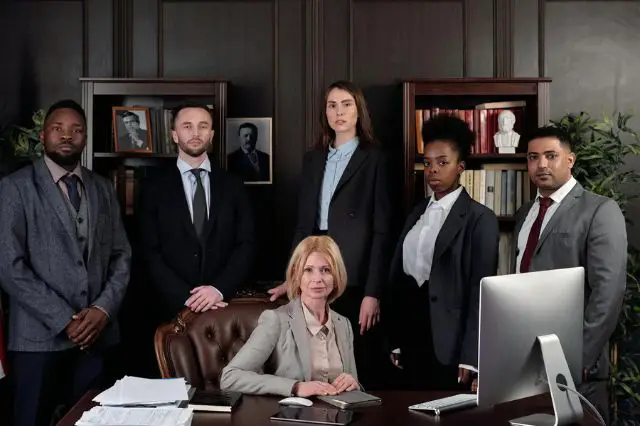Law
How Does a Car Accident Lawyer Navigate The Legal Process?


Navigating the legal landscape following a car accident can seem daunting. This is where a car accident lawyer steps in, guiding you effortlessly from the initial stages right through to the conclusion.
At the very start, a professional car accident lawyer serving Orlando offers a crucial service: an in-depth consultation. They will take the time to understand your case while making an informed assessment of its merits.
Your accident lawyer collects all relevant documents, formulates an effective legal strategy, and files the personal injury claim on your behalf, ensuring your rights are respected throughout. But their role doesn’t end there. They’re also expert negotiators, adept at the delicate art of settlement discussions, always striving to achieve the best possible outcome for you.
Initial Steps Taken By Car Accident Lawyers in Legal Proceedings
At the start of a car accident case, there are several steps that a lawyer takes to set the groundwork for the legal journey. These initial steps are vital in shaping the case’s trajectory and help build a strong foundation.
Legal Consultation and Case Assessment
The first move is always a comprehensive legal consultation and case assessment. Here, the lawyer meets with you to get a firsthand account of the accident. They listen to your story, ask relevant questions, and gather as much information as possible to understand the circumstances of the case.
Determining the Viability of Your Claim: The lawyer then evaluates the viability of your claim based on the gathered information. They analyze the facts, look at the law, and gauge the chances of success. It’s critical to determine whether it’s in your best interest to pursue the claim.
Gathering Necessary Documents: The lawyer collects all necessary documents to support your claim, such as medical records, police reports, and witness statements. These documents provide concrete evidence and are essential in establishing the facts and circumstances of the accident.
Planning the Legal Strategy: Once all the information is gathered, and the viability of your claim is established, the lawyer crafts a legal strategy. They anticipate potential challenges, devise solutions, and outline the best course of action that will lead toward the path of justice.
Filing the Personal Injury Claim
Filing the personal injury claim is a crucial next step in the process. This is where the lawyer officially puts your case into motion within the legal system.
Determining the Liable Party: The lawyer pinpoints the liable party responsible for the accident. They study the accident details, assess who was at fault, and officially name this party in the claim.
Drafting the Legal Documents: Next, they draft the legal documents necessary to file the claim. These documents, also known as pleadings, provide a clear and concise narrative of the accident, the resulting injuries, and why the named party is held responsible.
Interacting with Insurance Companies: The last step in this initial phase involves interacting with insurance companies. The lawyer communicates with the insurers of the liable party, presenting your claim robustly and compellingly while ensuring your rights are not infringed upon in the process.
How Car Accident Lawyers Assist in Negotiating Settlements
Car accident lawyers play a vital role in settlement negotiations, a pivotal part of the legal process. They employ a strategic and systematic approach to ensure your rights are upheld, and justice is served.
Understanding Settlement Negotiation Process
The negotiation process begins with an initial demand, crafted by your lawyer, that outlines your case and sets the tone for the discussions. This involves analyzing the incident, your injuries, and any resulting consequences while making clear the responsibility of the opposing party.
Once the initial demand is made, mediation follows. Your lawyer meets with the opposing side. Usually, the liable party’s insurance company or their lawyer, and the discussion begins. The goal here is to reach a resolution without going to court. Your lawyer articulates your case, defends your rights, and aims to find common ground.
It’s then down to accepting or declining the offer made by the opposing side. Your lawyer provides guidance here, helping you make an informed decision based on the strength of your case and the fairness of the offer.
Strategies for Achieving Optimal Settlement
Negotiating an optimal settlement involves a range of strategies. One critical aspect is leveraging evidence. Your lawyer ensures that all relevant evidence from the accident scene, medical reports, and other sources is presented clearly and effectively to support your case.
Sometimes, expert opinions may be used to strengthen your claim. This could involve medical experts explaining the extent of your injuries, accident reconstruction experts describing how the incident occurred, or even financial experts detailing the economic impact of your injuries.
The decision of when to settle is a strategic one. It involves assessing the progress of negotiations, the potential outcomes if the case goes to court, and the timing that would be most beneficial to your case. Your lawyer guides you in this process, offering advice based on their expertise and your best interests.
Legal Process Explanation By Car Accident Lawyers
In the pursuit of justice following a car accident, lawyers have an indispensable role in simplifying and guiding you through the intricate legal process. They guide you through post-trial legal processes, assist in the secure reception of the settlement amount, and analyze potential post-trial options. They ensure closure of the case is smooth and complete, taking care of any legal loose ends. Throughout this journey, a car accident lawyer is your advocate, advisor, and key to understanding and surmounting the legal hurdles on the road to justice.
Law
Legal Lifelines: How Personal Injury Attorneys Rescue Your Rights and Recovery


Life can take a sharp turn in the blink of an eye. One moment, you’re going about your day as usual; the next, you find yourself grappling with the aftermath of an injury.
The consequences can be profound, whether it’s a car crash, a workplace mishap, or a slip-and-fall incident. They can affect your physical health, financial stability, and emotional well-being.
In such moments of crisis, personal injury attorneys emerge as the unsung heroes, extending a lifeline to those in need. With their expertise, dedication, and unwavering commitment to justice, these professionals play a pivotal role in safeguarding individuals’ rights and recovery.
The Anatomy of a Personal Injury Case
It’s important to comprehend the components of a personal injury case before diving into the priceless contributions made by personal injury attorneys. Fundamentally, a personal injury claim occurs when someone is harmed as a result of the careless, reckless, or malicious actions of another party.
This harm can encompass a broad spectrum of injuries, ranging from physical to psychological. Moreover, it can occur in various settings, including on the road, at work, or on someone else’s property.
There are various types of personal injuries that you can suffer. Some of these injuries include vehicle accidents, slip-and-falls, medical malpractice, product liability, wrongful deaths, etc.
Once a personal injury occurs, the injured party can file a lawsuit to seek compensation. Consider the example of a recent car accident in Chicago, Illinois (IL). As covered by an NBC Chicago news article, two pedestrians were severely injured in a car crash. The crash occurred in the Ukrainian Village in Chicago, IL.
Both pedestrians were taken to the Stroger Hospital. Treating the injuries required a lot of medical expenses. Since the accident was not the pedestrians’ fault but that of the driver who crashed the vehicle, the victims can seek compensation. This can be done through a personal injury lawsuit.
Personal injury attorneys in Chicago, IL, can help the victims build a strong case against the negligent driver. They can help the pedestrians seek the rightful compensation for their damages.
There are several other things that personal injury lawyers can do to help a victim throughout the legal proceedings.
The Role of Personal Injury Attorneys
Personal injury attorneys are the guiding light in this intricate dance of legal proceedings. They help navigate the maze of statutes, regulations, and precedents precisely and skillfully.
Their multifaceted role encompasses a myriad of responsibilities, each geared towards protecting the rights and interests of their clients.
Legal Expertise and Advocacy
Their profound understanding of tort law is central to personal injury attorneys’ mission. It is the branch of civil law that governs personal injury claims. Armed with this knowledge, they meticulously analyze each case’s circumstances, identifying potential legal theories and avenues for recourse.
Whether it’s establishing negligence, proving causation, or quantifying damages, these legal experts leverage their expertise to construct compelling arguments. Moreover, personal injury attorneys serve as staunch client advocates, tirelessly championing their cause in negotiations and courtrooms.
Negotiation and Resolution
One of the hallmark skills of personal injury attorneys is their adeptness at negotiation. According to Nolo, personal injury negotiation requires contacting the insurance claims adjuster. Moreover, you need to have a settlement amount and avoid jumping on the first offer you get.
Negotiating might sound simple, but it is not. Insurance companies use different tactics to determine a settlement amount. This is where personal injury lawyers can help. Recognizing that most cases are resolved through settlements rather than trials, these attorneys employ strategic negotiation tactics to secure favorable outcomes.
Resource Mobilization and Support
Beyond their legal acumen, personal injury attorneys are a vital source of support and guidance for their clients. Recognizing the emotional and financial strain associated with personal injury claims, these attorneys provide much-needed reassurance and assistance at every step.
From coordinating medical treatment to facilitating communication with medical providers, personal injury attorneys streamline the recovery process. They alleviate the burden on their clients and allow them to focus on healing.
They frequently operate on a contingency fee basis as well, which means they only get paid if and when their clients get paid. This arrangement guarantees everyone, regardless of income level, access to legal representation.
How to Find the Right Personal Injury Lawyer for Your Case
According to IBISWorld, there were 50,693 personal injury lawyer businesses in the USA in 2023. This shows that there are ample options available when it comes to choosing a lawyer for your case.
Finding the right personal injury lawyer for your case is crucial to ensure you receive the best representation and outcome. Here are the steps you can take to find the right attorney:
- Identify your needs: Understand the specifics of your case. Personal injury law covers many situations, including car accidents, medical malpractice, workplace injuries, slip and fall accidents, etc. Determine the type of injury you’ve sustained and the circumstances surrounding it.
- Research: Use various resources to find potential lawyers. You can start with:
- Personal recommendations from friends, family, or acquaintances who have used personal injury lawyers.
- Online directories of attorneys.
- Bar association websites often have directories of lawyers categorized by specialty.
- Online review platforms to see what previous clients have said about different lawyers.
- Check credentials and experience: Look for lawyers who specialize in personal injury law and have experience handling cases similar to yours. Check their credentials, education, certifications, and any awards or recognition they may have received. Experience in the local court system can also be beneficial.
- Evaluate communication and rapport: Pay attention to how well you communicate with the lawyer during the consultation. A good lawyer should listen to your concerns, answer your questions clearly, and make you feel comfortable. Building a rapport with your lawyer is important as you will work closely throughout your case.
- Consider reputation and track record: Look into the lawyer’s reputation within the legal community and their track record of success in handling personal injury cases. You can search for any disciplinary actions or complaints against the lawyer through the state Bar Association.
- Trust your instincts: When choosing a personal injury lawyer, trust your instincts. Select someone you feel will effectively represent your interests and who you believe will work diligently to achieve the best possible outcome for your case.
Frequently Asked Questions
What Are the Benefits of a Personal Injury Lawyer?
Hiring a personal injury lawyer offers numerous benefits, including legal expertise, resource access, peace of mind, etc.
How Do I Prepare to Meet a Personal Injury Lawyer?
The process of hiring a personal injury lawyer usually starts with an initial meeting to analyze your case. Before the meeting, you should gather relevant evidence, note down any details, and prepare questions to ask.
What Are the Most Common Types of Personal Injury Cases?
Personal injury is a broad area of law encompassing different types of cases. Some of the most common types of personal injury cases include vehicle accidents, slips and falls, medical malpractice, and product liabilities.
To conclude, personal injury attorneys serve as beacons of hope, guiding injured individuals through the labyrinth of legal proceedings. These legal lifelines play a pivotal role in safeguarding the rights and recovery of those grappling with the aftermath of accidents and injuries.
Personal injury attorneys embody the essence of justice as pillars of support and agents of change. They ensure that no injury goes unanswered and no injustice goes unchallenged. In the grand tapestry of the legal landscape, they stand as champions of the vulnerable, illuminating the path to healing, restitution, and redemption.
Law
Navigating #MeToo: How Sexual Harassment Lawyers in Las Vegas Can Support Your Claim


In recent years, the #MeToo movement has sparked a global conversation about sexual harassment and assault. People from all walks of life have come forward to share their stories, leading to increased awareness and accountability. Las Vegas, a city known for its vibrant entertainment and bustling nightlife, is no exception to these issues.
If you’ve experienced sexual harassment in Las Vegas, you don’t have to face it alone. Sexual harassment lawyers in Las Vegas can provide the support and legal expertise you need to navigate your claim and seek justice. To hire the best lawyers, click here: Sexual Harassment Lawyers Las Vegas.
Understanding Sexual Harassment
Before delving into how sexual harassment lawyers in Las Vegas can assist you, let’s first understand what sexual harassment entails. Sexual harassment is a form of gender-based discrimination that violates Title VII of the Civil Rights Act of 1964. It can occur in various settings, including the workplace, public spaces, or even online. Sexual harassment can manifest in different ways:
1. Quid Pro Quo Harassment
Quid pro quo harassment occurs when someone in a position of power requests sexual favors in exchange for employment benefits, such as a promotion or job security. It creates an intimidating and hostile environment, forcing victims to comply with unwelcome advances to maintain their livelihood.
2. Hostile Work Environment
A hostile work environment arises when offensive comments, unwelcome advances, or inappropriate behavior create an atmosphere that is hostile, intimidating, or offensive. This type of harassment can come from supervisors, coworkers, or even customers.
3. Online Harassment
With the rise of social media and online platforms, sexual harassment has extended into the digital realm. Online harassment can involve cyberbullying, explicit messages, or the sharing of explicit content without consent.
The Importance of Legal Representation
If you’ve experienced sexual harassment in Las Vegas, seeking legal representation is a crucial step towards justice. Sexual harassment lawyers in Las Vegas can provide several benefits to support your claim:
1. Expertise in Sexual Harassment Laws
Sexual harassment laws can be complex and vary from state to state. Experienced lawyers in Las Vegas are well-versed in both federal and Nevada-specific laws related to sexual harassment. They can help you understand your rights and the legal options available to you.
2. Personalized Guidance
Every sexual harassment case is unique, and lawyers in Las Vegas understand this. They will provide you with personalized guidance tailored to your specific situation. This ensures that you receive advice and strategies that align with your goals.
3. Investigation and Evidence Gathering
One of the key roles of sexual harassment lawyers is to conduct thorough investigations into your case. They will gather evidence, interview witnesses, and collect documentation to build a strong case on your behalf. This includes preserving any relevant emails, text messages, or other forms of communication.
4. Negotiation and Settlement
Many sexual harassment cases are resolved through negotiation or settlement rather than going to court. Lawyers in Las Vegas have the negotiation skills to advocate for your interests and secure a fair settlement that compensates you for your suffering and losses.
5. Representation in Court
If a settlement cannot be reached, your sexual harassment lawyer in Las Vegas will represent you in court. They will present your case, cross-examine witnesses, and argue on your behalf to seek justice through litigation.
Steps to Take When Faced with Sexual Harassment
If you believe you’ve experienced sexual harassment in Las Vegas, it’s important to take specific steps to protect your rights and strengthen your case. Here’s a step-by-step guide:
1. Document Everything
Start by documenting every instance of harassment. This includes writing down dates, times, locations, and descriptions of what happened. If there are witnesses, try to obtain their contact information.
2. Preserve Evidence
Preserve any evidence related to the harassment. This includes text messages, emails, voicemails, or any physical evidence that may exist. It’s crucial to prevent any potential destruction of evidence.
3. Report the Harassment
If the harassment is occurring in the workplace, report it to your supervisor, human resources, or the appropriate authority within your organization. Keep records of your reports, including who you spoke to and when.
4. Seek Legal Counsel
Contact a sexual harassment lawyer in Las Vegas as soon as possible. They can provide guidance on your next steps and help you understand your legal rights.
5. Follow Legal Advice
Listen to your lawyer’s advice and instructions carefully. They will guide you through the legal process and ensure that your rights are protected.
6. Cooperate with Investigations
If an investigation is launched, cooperate fully. Provide any evidence or information requested by your lawyer or the investigating authority.
7. Consider Mediation or Litigation
Depending on the circumstances, you may have the option to pursue mediation or litigation. Your lawyer will help you decide the best course of action based on your goals and the strength of your case.
The Role of Sexual Harassment Lawyers in Las Vegas
Sexual harassment lawyers in Las Vegas play a pivotal role in supporting victims and advocating for justice. Here are some key aspects of their role:
1. Legal Advocacy
Your lawyer will serve as your legal advocate, representing your interests at all stages of the legal process. They will use their expertise to navigate complex legal procedures and fight for your rights.
2. Emotional Support
Experiencing sexual harassment can be emotionally challenging. Sexual harassment lawyers in Las Vegas are not just legal professionals; they are also a source of emotional support. They understand the trauma you may be going through and can offer guidance and empathy.
3. Confidentiality
Lawyers are bound by strict rules of confidentiality. You can trust that your lawyer will keep your personal information and case details confidential, ensuring your privacy is protected.
4. Timely Action
Sexual harassment claims often have time limits for filing. Your lawyer will ensure that all necessary paperwork is filed promptly and that deadlines are met to preserve your legal rights.
5. Comprehensive Representation
Whether your case is resolved through negotiation, mediation, or litigation, your lawyer will provide comprehensive representation to achieve the best possible outcome for you.
Finding the Right Sexual Harassment Lawyer in Las Vegas
Choosing the right sexual harassment lawyer is essential for the success of your case. Here are some factors to consider when selecting legal representation:
1. Experience
Look for lawyers in Las Vegas with significant experience in handling sexual harassment cases. Experience can make a substantial difference in the outcome of your case.
2. Reputation
Research the reputation of potential lawyers by reading reviews, seeking recommendations, and checking their track record of successful cases.
3. Communication
Effective communication is key. Ensure that you feel comfortable discussing your case with the lawyer and that they are responsive to your questions and concerns.
4. Fees and Costs
Discuss fees and costs upfront with potential lawyers. Many sexual harassment lawyers in Las Vegas work on a contingency fee basis, meaning they only get paid if you win your case.
5. Compatibility
Choose a lawyer with whom you feel comfortable and confident. Building a strong attorney-client relationship is crucial for a successful outcome.
Conclusion
Experiencing sexual harassment in Las Vegas or anywhere else is a traumatic and unjust experience. However, you don’t have to face it alone. Sexual harassment lawyers in Las Vegas are dedicated to supporting victims and seeking justice on their behalf.
Remember that documenting incidents, preserving evidence, and seeking legal counsel are essential steps in the process. With the guidance and expertise of a skilled sexual harassment lawyer, you can navigate the complexities of the legal system and work towards a resolution that holds the perpetrator accountable and provides you with the compensation and closure you deserve. In the era of #MeToo, your voice matters, and legal professionals in Las Vegas are here to help you make it heard.
Law
How to Find Ohio Arrest Records Online: Your Ultimate Guide


In today’s digital age, accessing information has become remarkably convenient, and this holds true even for legal records such as arrest records.
In this blog post, we’ll dive deep into the world of Ohio arrest records, exploring what they are, why they are public, and how you can easily find them online for free.
What is an Ohio Arrest Record?
An Ohio arrest record is a comprehensive document containing details about an individual’s arrest history and related incidents within the state of Ohio. This record includes information such as the person’s name, date of birth, mugshot, arrest date, charges filed against them, and case disposition. It’s important to note that an arrest record does not necessarily indicate guilt; it merely records the fact of the arrest and the subsequent legal proceedings.
Why Ohio Arrest Records Public?
In Ohio, as in many other states, arrest records are considered public records. This means that they are accessible to anyone interested in retrieving the information, with certain limitations imposed for privacy and security reasons. The main reasons behind the public availability of Ohio arrest records are transparency, accountability, and the right to access information about potential criminal activities within the community. By allowing individuals to access these records, the state ensures that citizens are well-informed about the legal history of those around them.
Ohio Arrest Records Statute of Limitations
The concept of the statute of limitations plays a pivotal role in shaping the accessibility of Ohio arrest records. This legal principle is fundamentally centered around delineating the temporal boundaries during which legal proceedings can be initiated against an individual in relation to a particular offense. Within the context of Ohio’s legal framework, the statute of limitations manifests as a variable parameter contingent upon the specific characteristics of the crime in question. The intricate interplay between the severity of the offense and the temporal limitations underscores the nuanced nature of the state’s judicial system.
Ohio’s legal landscape exhibits a diverse spectrum of statute of limitations durations, aligning with the spectrum of offenses that can transpire. While less severe transgressions are subject to a comparatively compressed statute of limitations periods, graver offenses such as homicide, sexual assault, and abduction are notably exempt from any temporal limitations. This distinctive legal provision extends law enforcement agencies the prerogative to access arrest records irrespective of the temporal distance from the incident, thereby ensuring that acts of profound criminality do not elude accountability over time.
The absence of a statute of limitations for heinous crimes reverberates as a resolute commitment to justice, circumventing the possibility that such offenses might evade legal repercussions merely due to the passage of time. Consequently, this serves as a deterrent against evasive strategies that individuals may employ to avoid accountability, reassuring society that the gravest violations of its norms will be met with unyielding scrutiny and potential legal action, regardless of temporal constraints.
This nuanced system intertwines the preservation of justice and the pragmatic recognition of the transitory nature of evidence and memories. While certain offenses might leave ephemeral traces that fade with time, Ohio’s approach ensures that the quest for justice remains undeterred, reinforcing the societal belief in the accountability of those who commit reprehensible acts. In essence, the statute of limitations within Ohio’s arrest records framework captures the state’s endeavor to strike a balance between temporal realities and the unwavering pursuit of justice, an equilibrium that resonates with the evolving dynamics of legal philosophy and societal values.
Ohio Arrest Records and Employment Background Checks
Ohio arrest records can play a significant role in employment background checks within the state. When conducting background checks on potential employees, employers often seek to evaluate an applicant’s criminal history to ensure the safety and integrity of their workplace. Ohio law permits employers to inquire about an applicant’s past convictions during the hiring process. However, it’s important to note that certain restrictions and considerations exist to strike a balance between an individual’s rehabilitation and employment prospects. The state follows a “ban the box” policy, delaying inquiries into an applicant’s criminal history until later stages of the hiring process to provide them with a fair chance.
Moreover, arrest records that did not result in convictions are not typically used as a basis for employment decisions in accordance with Ohio’s Fair Hiring Act. This framework aims to prevent discrimination against individuals with arrest records and allows them to be judged on their qualifications rather than their past. As such, Ohio’s approach to arrest records and employment background checks emphasizes fairness and rehabilitation while ensuring the safety of workplaces and the public.
Furthermore, Ohio’s laws regarding the use of arrest records in employment background checks align with the principles of the Fair Credit Reporting Act (FCRA), a federal law that regulates the collection, dissemination, and use of consumer information, including criminal records. This Act mandates that employers obtain written consent from applicants before conducting background checks, which can include arrest records and criminal history. Additionally, if an employer decides to take adverse employment actions based on the information found in the background check, such as not hiring an applicant, they are required to provide the individual with a copy of the report and a summary of their rights under the FCRA.
It’s worth noting that employers in Ohio, as in other states, should exercise caution when using arrest records as a basis for employment decisions. Arrests do not necessarily indicate guilt; individuals are considered innocent until proven guilty in a court of law. In cases where an arrest did not lead to a conviction or where the charges were dropped, it is generally advised not to consider these records in the hiring process. This approach helps prevent unfair discrimination against individuals who may have been wrongfully arrested or whose circumstances have changed since the time of the arrest.
Conclusion
In conclusion, navigating the realm of Ohio arrest records in the digital age offers a glimpse into the delicate balance between justice, transparency, and individual rights. These records, accessible to the public with consideration for privacy and security, serve as a crucial tool for accountability and community awareness. Ohio’s nuanced approach to the statute of limitations showcases the state’s commitment to unwavering justice, ensuring that even the most heinous offenses remain subject to legal scrutiny regardless of the passage of time.
This commitment aligns with the state’s employment background check policies, wherein a fair evaluation of an individual’s qualifications takes precedence over their past encounters with the law. The resonance between Ohio’s framework and federal regulations further solidifies the emphasis on fairness and rehabilitation, ultimately shaping a society where the pursuit of truth and a just equilibrium are central tenets of legal philosophy and societal values.
-



 Quotes4 years ago
Quotes4 years ago125 Inspirational Car Quotes and Captions to Celebrate Your New Car
-



 Growth4 years ago
Growth4 years ago188 Deep Hurt Quotes with Images
-



 Quotes3 years ago
Quotes3 years ago148 Romantic Love Quotes for Her from the Heart
-



 Quotes3 years ago
Quotes3 years ago185 Cute Boyfriend Quotes for the Guy You Love
-



 Quotes3 years ago
Quotes3 years ago141 Best Heart Touching Quotes about Love, Life, and Friendship
-



 Quotes3 years ago
Quotes3 years ago134 Time Flies Quotes for the Unforgettable Moments
-



 Quotes3 years ago
Quotes3 years ago122 Inspirational Kite Quotes That’ll Make You Wanna Fly Right Now
-



 Quotes4 years ago
Quotes4 years ago101 Powerful Black Women Quotes to Empower You







